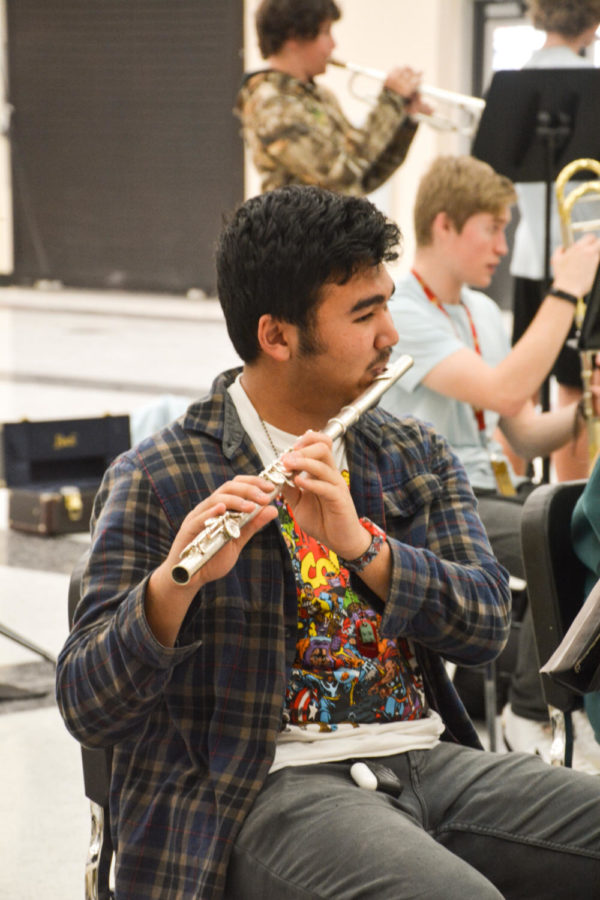Jazz: a form of expression spanning generations
Senior Kai Vicente plays flute in jazz bands rehearsal. “My favorite part about playing an instrument is how well every instrument can play together and how well it sounds all together,” Vicente said.
While playing jazz, Wando Alumni, Charlton Singleton, doesn’t just play notes. He plays his emotions: using only his trumpet, fingers, and air as his translator.
Singleton finds himself able to communicates through this music, conveying what he wants to through jazz and improvisation
“[Jazz] is how you’re feeling at the time. Play a song that has a joyful groove and you’re feeling that joy. You express yourself musically that way, if it’s more of a somber situation or song that you’re playing, or ballad that’s about love, you can communicate your feelings in how you play,” Singleton said.
Since jazz is based heavily on improvisation, or making music in the midst of the song with no preparations or written down notes, Singleton believes that it’s there that musicians truly express themselves.
“How you improvise, and how you make a melody is how you can convey those feelings with your instrument. It takes practice, but everything takes practice for that matter,” Singleton said.
Deferring from classical and contemporary music, Singleton thinks jazz is special in the way of how it originated, and that rather than just notes on the page, the player has to write some of the music themself.
“I think [jazz is] important. It’s an American art form. It definitely is unique in that it combines the composer and the artist, because you can take a song that you know and improvise over it. You can add your own unique ideas to what the composer did, you can develop it. So that’s really what makes it unique, the interpretation is limitless,” Singleton said.
Singleton points the history of jazz in Charleston to the Jenkins Orphanage. The orphanage was founded by the Reverend Daniel Jenkins, and it had a music class where the residents of the orphanage learned a variety of instruments, and eventually learned to improvise.
The orphanage formed a band and would go play on the streets of Charleston, until word of them started to spread. As a band, they traveled through the Southeast of the U.S. and eventually Europe. Many of the members became successful musicians.
“There are a lot of them that ended up being in some of the greatest jazz bands, whether it was Duke Ellington’s band or Count Basie’s band or Broadway musicians. They were playing for presidential inaugurations, world fairs. So the history of jazz in Charleston is really quite comparable to the history of jazz of New Orleans,” Singleton said.
As a musician, Singleton was introduced to jazz throughout middle and high school, when he attended Wando in the late eighties and participated in the Wando Band of the time. However, he only got serious about jazz in college, where he attended the University of South Carolina.There, he was drawn to jazz rather than other genres because of the freedom that came with it.
As a musician, Singleton’s proudest accomplishments have not come from huge performances or from winning awards, but rather from composing music.
“I never thought that I would be able to do any of the things I have,” Singleton said. “As time went on, my composing…developed and I’ve been able to release my own recordings under my name.”
Singleton is a founding member and trumpet player of the 2x Grammy winning band Ranky Tanky. However, the group is not just as simple as a jazz band, instead they mainly focus on interpreting Gullah sounds into their music.
“It’s Gullah before anything. We get lumped into jazz,… folk, …blues, …gospel and spiritual.if you think about it, Gullah was here before any of those genres were ever created. And so you can find Gullah as definitely the influencer to those styles of music,” Singleton said.
Similarly to jazz, Gullah is based on a certain rhythm. While Ranky Tanky plays, Singleton finds different genres coming out in their music as those genres have been largely influenced by Gullah.
“With Gullah, it’s all about the rhythm, and everything else that we do, musically, revolves around that rhythm. So it starts with when we’re composing music, or when we’re interpreting a song, it starts with the rhythm, and then we sort of form everything else around it,” Singleton said.
Even though Ranky Tanky is focused on Gullah, elements of other genres peak through their music.
“When we’re playing live, and it’s time for someone to take a solo, that’s when improvisation comes in, that’s when people lump us into jazz. Sometimes the actual content of the song could have religious overtones, and so that’s when we get lumped into gospel or spiritual music. Sometimes people think, ‘I heard that song being sung by a folk musician’, and so they lump us into the folk music category.” Singleton said.
Along with composing and performing, Singleton also teaches. He was a former band director, and now currently teaches jazz camps; he believes music and jazz education is essential in students.
Singleton advises that if students are to improve, the biggest factor is in the time and effort they put into it.
“Practice, practice, practice. Everything that you do, starts with practicing,” SIngleton said.
Senior Wes Baldwin plays the trombone in both concert and jazz band. This year, he is the first chair of the jazz Band at Wando, and first chair of All-State Jazz Band. His interest in jazz partly stems from how it contrasts from usual music.
“I like jazz because it uses different kinds of chords and melodies that you don’t see in your usual radio songs,” Baldwin said. “Also, compared to concert band I usually get to play a lot louder because there’s less instruments. I also get to use more of the range on my instrument. I love how there’s usually more emphasis on your part and more solos.”
As Baldwin is playing both concert and jazz styles constantly, he notices that playing jazz has a different approach than concert and marching band.
“With improvisation, I get the freedom to put my own ideas into the music. We’re playing something you wouldn’t see in your normal concert playing or a marching band,” Baldwin said.
Jazz and percussion teacher, Jefferey Handel, finds that jazz can change how music is thought about.
“You play the same tunes, but those tunes can be a totally different kind of arrangement, or feel, or they can be completely different, depending on who plays the tune. But it’s still the same tune,” Handel said.
Handel has been able to share his appreciation with students through the Jazz Band. He has found that in jazz, each artist leads a student to something new.
“[Jazz Band] is a chance to work with a small group of people that all play really well. And just introducing them to different styles and different artists…every artist constitutes a new kind of journey of discovery with different artists and people. So I like that. It’s a chance to do a bunch of different styles and rhythms with the kids,” Handel said.
As students learn more and more about the music they play, they also learn more about music that’s out there.
“I can see it when the appreciation really starts each year. when they start going away from just Googling, just ‘ cool jazz solo’ to win when more of, ‘Hey, I found this guy that this person played trombone on this album with this guy, and I liked his solo’ and they just start to listen to more*999999,” Handel said.
In Jazz Band, Handel finds that students don’t only become more adapted to jazz, but better musicians and people overall.
“We all get really comfortable with notes in the page, rely on those. Jazz doesn’t really have that. So with that, that idea of self discovering and making progress. It’s tough, because you need to be comfortable with making mistakes. So I have the kids just start off with just like improv on just one note. So there’s no wrong notes at the beginning,” Handel said.
Handel focuses on making Jazz Band a place for students to feel comfortable about messing up, but also learn in the process from their mistakes. By teaching the students this,the music that follows continues to improve.
“It’s a situation where as long as you’re trying to do something, you make music. It’s a safe space to make bad choices musically. It’s just not being afraid to make mistakes,” Handel said.
“And that’s kind of what we try and do just with that, just trying to expand people’s horizons on what they think sounds good, or doesn’t sound good. And then the ability to use that knowledge to make music.”
Handel also teaches students about the history and importance of Jazz. He finds it is important for students to realize jazz is more than just a music genre.
“[Jazz] is one of the things that although it’s everywhere now,Its roots are firmly here. It’s a mixing of cultures, some of the first times that people broke racial lines was for jazz. It’s one of the things that there’s always something that you can hear and that you see in our culture,” Handel said.
Handel also finds it important in the way that it shows students that it’s forever changing and can show the progress of art.
“As far as for musicians, jazz has people that are innovating and changing it all the time. So not only are they trying to perform better, but they’re adding new ideas to it. And it’s an always evolving art form,” Handel said. “I think that’s kind of the beauty of it, it’s like everybody’s trying to push what can be done, even though it’s still jazz. But there’s new styles and new ways and new artists that are doing it in different ways that make it more and more interesting.”
Jazz is a way for Handel to personalize the music to his emotions, using it for both conveying them and changing them.
“It’s a great way to express how I’m feeling as a musician, if you’re feeling angry that day, you can play that if you’re feeling melancholy, you can play that. And then on the other side, if you’re feeling anxious or sad you can go the opposite way and play in a way and can change your mood,” Handel said.
As music is meant to be shared, it has served Handel as not only a way to express himself, but to carry them across to others.
“It’s a way to share expressions, just share emotions with other people. You don’t just get on stage and just blindly play music. You are aware the entire time just conversing through music and communicating with each other.”
Both Singleton and Handel find the community in jazz is created through these shared emotions that have been through music. It’s also about the understanding of the creation of music.
“I think that’s what’s great about jazz, you are just always creating. If you have a group that locks in, it’s fun. It’s a joyous occasion and it’ll change your life,”Handel said.


